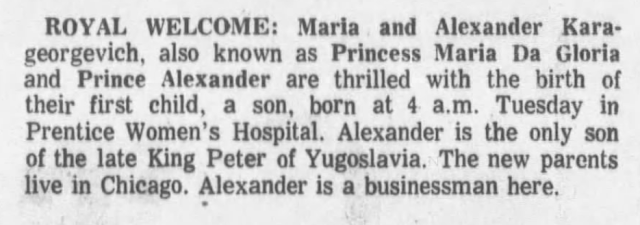Today, Hereditary Prince Peter of Serbia marks his fortieth birthday.
 |
| Crown Prince Alexander of Serbia and Princess Maria da Glória of Orléans-Braganza on their wedding day. Prince Regent Paul of Yugoslavia can be seen to the far right of the photograph. |
 |
| The Royal Wedding of the Karageorgevich and Orléans-Braganza. (left to right): Prince Juan Carlos of Spain, the Count of Paris, Princess Sofía of Spain with her children (Infante Felipe, Infanta Cristina, and Infanta Elena), the Countess of Barcelona, Princess Maria da Glória, Prince Alexander, Princess Anne, King Constantine of Greece (with his children Crown Prince Pavlos and Princess Alexia in the front), Infante Alfonso of Spain, and Queen Anne-Marie of Greece. |
 |
| The newlyweds: Crown Prince Alexander and Crown Princess Maria da Glória of Serbia. |
 |
| The Chicago Tribune of 6 February 1980 heralds Prince Peter's arrival. |
On 5 February 1980, the prince was born at Chicago, Illinois, as the first child of Crown Prince Alexander of Serbia (b.1945) and Princess Maria da Glória of Orléans-Braganza (b.1946). Alexander and Maria da Glória had married in 1972. Their infant son's name paid tribute to both the father and mother's fathers: King Peter II of Yugoslavia (1923 - 1970) and Prince Pedro Gastão of Orléans-Braganza (1913 - 2007). At his christening, Hereditary Prince Peter received his cousin Prince Alexander of Yugoslavia (1924 - 2016), the only surviving son of Prince Regent Paul of Yugoslavia and Princess Olga (née Greece and Denmark), as his godfather.
Peter was followed by two younger brothers: the fraternal twin princes Philip and Alexander (b.1982). In 1985, the marriage of Crown Prince Alexander and Princess Maria da Glória ended in divorce. By the end of 1985, Peter and his brothers had gained a new stepmother and stepfather. In September 1985, Crown Prince Alexander of Serbia married Katherine Clairy Batis (b.1945) at the Orthodox Church in London. In October 1985, Princess Maria da Glória married don Ignacio de Medina y Fernández de Córdoba, 19th Duke of Segorbe (b.1947). Peter gained two sister's from his mother's second marriage: Sol (b.1986) and Luna (b.1988).
 |
| Hereditary Prince Peter of Serbia |
Prince Peter graduated from The King’s School Canterbury in England. There the prince obtained three A levels in Art, French and Spanish. Peter then completed an art foundation course at the Camberwell College of Arts in London. The hereditary prince then pursued studies in graphic design at the Rhode Island School of Design. It is in this field that Prince Peter currently works as a graphic design professional.
Hereditary Prince Peter of Serbia lives in London. Although all three reside in different countries, Peter is very close to his brothers Philip and Alexander. After his father Crown Prince Alexander, Peter is first in the line of succession to the Headship of the Royal House of Serbia. Prince Peter is also in the line of succession to the British throne. The hereditary prince is often present in Serbia to support his father Crown Prince Alexander, Crown Princess Katherine, and their family in their activities.
We wish Prince Peter many happy returns of the day!
 |
| Crown Prince Alexander of Serbia and his three sons (left to right): Hereditary Prince Peter, Prince Philip, and Prince Alexander. |
+++++++
The Ancestry of Hereditary Prince Peter of Serbia 1. Hereditary Prince Peter of Serbia (b.Chicago, Illinois, USA 5 February 1980)
Parents 2. Crown Prince Alexander of Serbia (b.London 17 July 1945) who married at Villamanrique de la Condesa, Seville, Spain on 1 July 1972 (divorced 1985) 3. Princess Maria da Glória of Orléans-Braganza (b.Petrópolis 13 December 1946)
Grandparents 4. King Peter II of Yugoslavia (Belgrade 6 September 1923 - Denver, Colorado, USA 3 November 1970)
who married at London on 20 March 1944
5. Princess Alexandra of Greece (Athens 25 March 1921 - Burges Hills, nr Lewes 30 January 1993)
6. Prince Pedro Gastão of Orléans-Braganza (Château d'Eu 19 February 1913 - Seville 27 December 2007)
who married at Seville on 18 December 1944
7. Princess Esperanza of Bourbon-Two Sicilies (Madrid 14 June 1914 - Villamanrique de la Condesa 8 August 2005)
Great-Grandparents
8. King Alexander of Yugoslavia (Cetinje, Montenegro 16 December 1888 - Marseilles 9 October 1934)
who married at Belgrade on 8 June 1922
9. Princess Marie of Romania (Gotha 8 January 1900 - London 22 June 1961)
10. King Alexander of the Hellenes (Tatoi 1 August 1893 - Athens 25 October 1920)
who married at Athens on 4 November 1919
11. Aspasia Manos (Athens 4 September 1896 - Venice 7 August 1972)
12. Prince Pedro de Alcântara of Orléans-Braganza, Prince of Grão Pará (Petrópolis 15 October 1875 - Petrópolis 29 January 1940)
who married at Versailles on 14 November 1908
13. Countess Elisabeth Dobrzensky von Dobrzenicz (Chotebor, Bohemia 7 December 1875 - Sintra, Portugal 11 June 1951)
14. Prince Carlo of Bourbon-Two Sicilies, Infante of Spain (Gries 10 November 1870 - Seville 11 November 1949)
who married 2ndly at Woodnorton, Worchester, United Kingdom on 16 November 1907
15. Princess Louise d'Orléans (Cannes 24 February 1882 - Seville 18 April 1958)








No comments:
Post a Comment